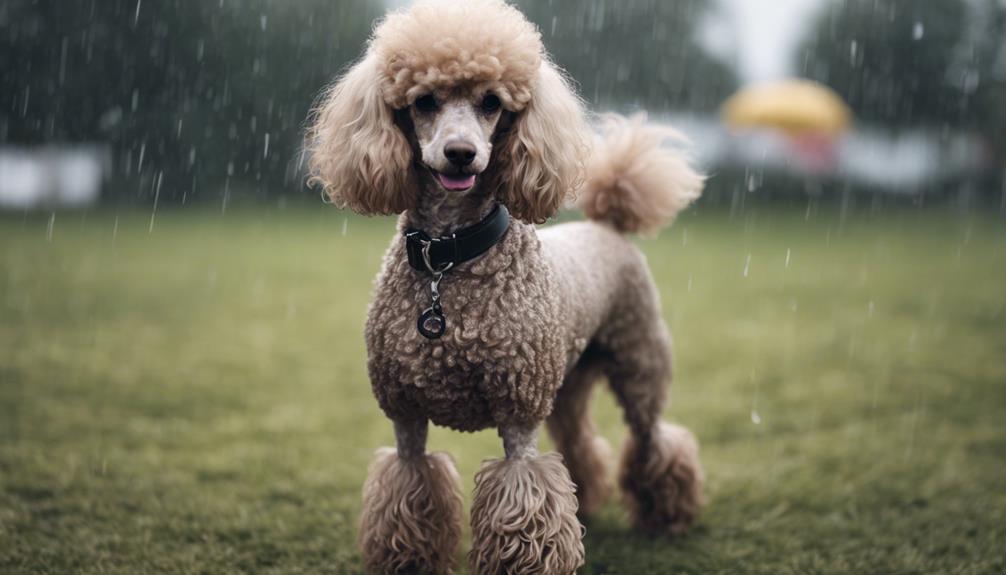Imagine a brisk winter day, a light dusting of snow covering the ground as your Poodle eagerly bounds outside. You may not realize the impact weather has on your furry companion's health, especially when it comes to colder temperatures. From their sensitive skin to the risks of frostbite, understanding how weather influences your Poodle's well-being is crucial. Stay tuned to discover key strategies to ensure your Poodle stays healthy and happy, no matter the season.
Key Takeaways
- Poodles require warm coats and shelter in cold temperatures for proper insulation and comfort.
- Skin sensitivity in Poodles necessitates monitoring for dryness, redness, and potential frostbite risks in freezing conditions.
- Adjusted grooming practices and monitoring allergies are vital for maintaining Poodle coat health and managing skin irritations.
- Varied exercise routines, indoor stimulation, and proper nutrition play crucial roles in ensuring year-round Poodle health and well-being.
Poodle Coat Adaptation

Proper grooming and outfitting your Poodle with warm coats are essential for ensuring their coat adaptation in colder climates. Poodles have a dense, curly coat that serves as insulation and protection against the cold. While Standard Poodles tend to be more resilient to lower temperatures compared to Miniature or Toy Poodles, all Poodles are susceptible to discomfort below 40°F (4.4°C), with temperatures below 32°F (0°C) being particularly challenging for them.
To help your Poodle adapt to colder weather, regular grooming is crucial. This includes brushing their coat to prevent matting, which can reduce the insulation properties of their fur. Additionally, providing your Poodle with a warm coat when venturing out in chilly temperatures can help maintain their body heat and overall comfort. By taking these steps, you can support your Poodle in adapting to colder climates and ensure they stay cozy and healthy during the winter months.
Temperature Regulation Challenges
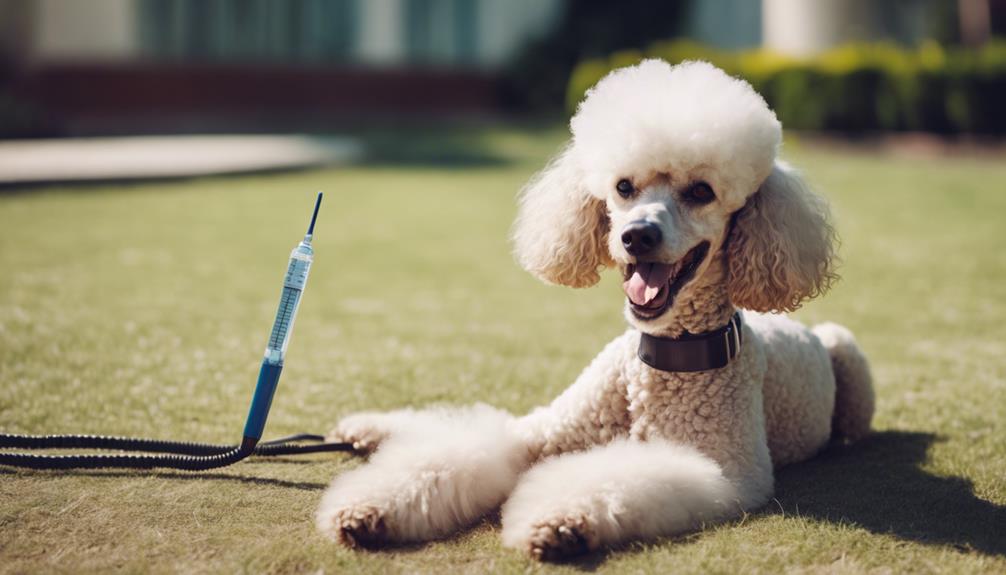
Facing colder temperatures, Poodles encounter challenges in regulating their body heat effectively due to their unique coat composition. The dense, curly coat that Poodles possess acts as insulation against the cold, but when temperatures drop below 40°F (4.4°C), they may start feeling uncomfortable. Standard Poodles are generally more resilient to cold weather than Miniature or Toy Poodles. However, when the mercury dips below freezing at 32°F (0°C), all Poodles can struggle with maintaining a comfortable body temperature.
To assist your Poodle in managing their body temperature during chilly weather conditions, consider providing them with warm coats and shelter. These measures can help mitigate the discomfort they may experience when exposed to cold temperatures. By taking proactive steps to protect your Poodle from the cold, you can ensure that they stay cozy and healthy even when faced with challenging weather conditions. Remember, proper winter care practices are crucial for your Poodle's well-being in colder climates.
Skin Sensitivity Concerns

Sensitive skin is a common concern for Poodles, especially when exposed to extreme weather conditions. The impact of weather on Poodle skin can be significant, leading to discomfort and potential health issues. Here are some key points to consider regarding skin sensitivity concerns in Poodles during different weather conditions:
- Dryness and Itchiness: Cold weather can strip the skin of its natural oils, leading to dryness and itchiness in Poodles. This can cause irritation and discomfort for your furry companion.
- Exacerbation of Skin Irritations: Harsh winter conditions can exacerbate existing skin irritations and allergies in Poodles. It is essential to monitor your Poodle's skin closely during such weather.
- Protective Measures: Proper grooming practices and regular moisturizing can help protect your Poodle's skin during cold weather, providing a barrier against the harsh elements.
- Early Detection: Monitoring for signs of skin issues like redness, flakiness, or unusual bumps is crucial for maintaining your Poodle's skin health and addressing any problems promptly.
Winter Exercise Considerations

When considering the impact of winter weather on Poodle health, it is essential to address the necessary adjustments for their exercise routines to ensure their well-being and vitality. Poodles still require exercise even in cold weather to stay healthy and active. Indoor play sessions can be a great way to fulfill their exercise needs during winter when outdoor activities might be limited. Short walks outside, even in cold weather, can still be beneficial for poodles, but adjustments need to be made to ensure their safety and comfort. By adjusting exercise routines based on the weather, you can help maintain your poodle's health and prevent issues like weight gain. Winter exercise not only keeps them physically fit but also provides mental stimulation, which is crucial for their overall well-being.
| Indoor Games | Short Outdoor Walks | Exercise Adjustment |
|---|---|---|
| Hide and Seek | 15-20 mins per day | Introduce puzzles |
| Fetch | On-leash | Decrease intensity |
| Puzzle Toys | Monitor for signs | Increase indoor |
| Interactive Feeder | of cold discomfort | playtime |
| Tug of War |
Frostbite Risk Awareness
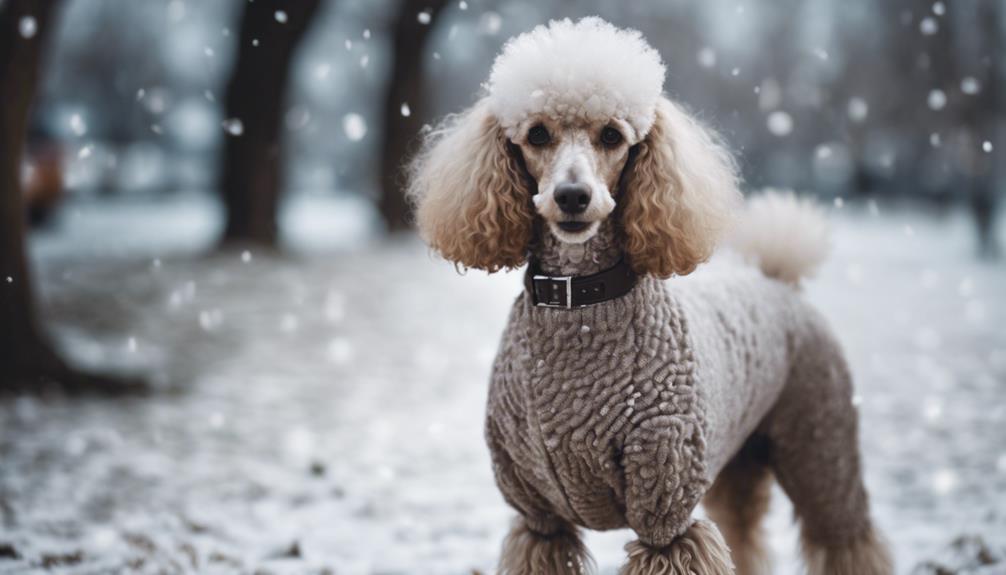
You should be aware of the risk of frostbite in poodles, as they are vulnerable to cold temperatures, especially in freezing conditions. Protect your poodle's ears, tail, and paws by monitoring their exposure to extreme cold and wind chill factors. Providing warm shelter, winter clothing, and limiting their time outdoors in freezing weather can help prevent frostbite.
Frostbite Prevention Tips
To protect your Poodle from the heightened risk of frostbite due to their single-layer coat, it is essential to implement effective prevention measures in cold weather. Here are some tips to help prevent frostbite in your beloved pet:
- Keep them warm: Provide your Poodle with a cozy sweater or jacket to help retain body heat.
- Limit outdoor exposure: Avoid extended periods outdoors in freezing temperatures to reduce the risk of frostbite.
- Protect vulnerable areas: Pay special attention to your Poodle's ears, tail, and paws, as these areas are more prone to frostbite.
- Provide shelter: Ensure your Poodle has access to a warm and sheltered area during cold weather to prevent frostbite.
Signs of Frostbite
In extremely cold conditions, it is crucial to recognize the signs of frostbite in your Poodle, particularly in their ears, tail, and paws, where this condition commonly affects them. Signs of frostbite in Poodles include pale, gray, or blue skin discoloration in the affected areas. You may notice your Poodle showing signs of pain, swelling, or blistering on frostbitten areas. If you touch the frostbitten skin, it may feel cold, hard, and numb. Immediate veterinary care is necessary if frostbite is suspected in your Poodle to prevent tissue damage and complications. Being vigilant and responsive to these signs can help protect your Poodle's health and well-being in cold weather.
Summer Heat Management

During the summer months, managing the heat exposure of poodles becomes critical due to their dense coats and limited ability to regulate body temperature efficiently. Here are some essential tips to help you ensure your poodle stays safe and comfortable in hot weather:
- Provide Shade: Create shaded areas in your yard where your poodle can retreat from the direct sun, especially during the hottest parts of the day.
- Offer Cool Water: Always have fresh, cool water available for your poodle to drink. Staying hydrated is crucial for preventing heat-related issues.
- Limit Outdoor Activities: Avoid strenuous exercise during peak heat hours. Opt for walks in the early morning or late evening when temperatures are cooler.
- Use Cooling Measures: Consider using cooling mats or vests to help lower your poodle's body temperature on particularly hot days.
Allergies and Weather Triggers
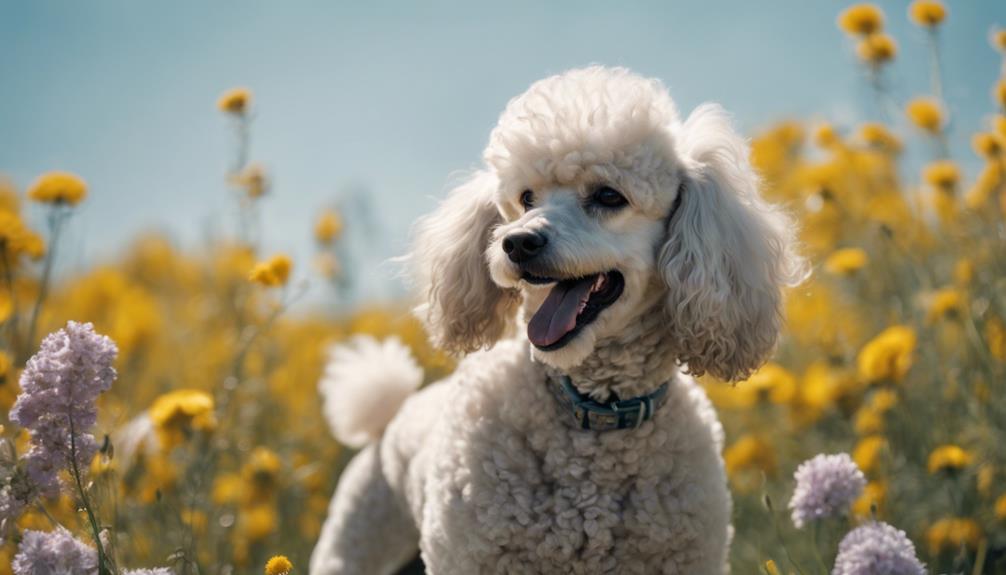
When managing allergies in Poodles, understanding their sensitivity to weather triggers like pollen, mold, and dust is crucial for effective symptom control. Weather fluctuations play a significant role in exacerbating allergy symptoms in Poodles. For example, high pollen counts during spring and fall can lead to increased itching, skin irritation, and respiratory issues in allergic Poodles. Additionally, changes in humidity levels can impact the severity of allergic reactions. Monitoring weather patterns and allergen levels can help pet owners anticipate and manage their Poodle's allergy symptoms proactively.
It is essential to be aware of the specific weather conditions that trigger your Poodle's allergies. By keeping track of pollen forecasts and adjusting outdoor activities accordingly, you can reduce your furry friend's exposure to allergens. Regular grooming and cleaning routines can also help minimize the impact of weather triggers on your Poodle's health. Remember, staying informed and taking preventive measures can make a significant difference in managing your Poodle's allergies effectively.
Grooming Needs in Changing Climates
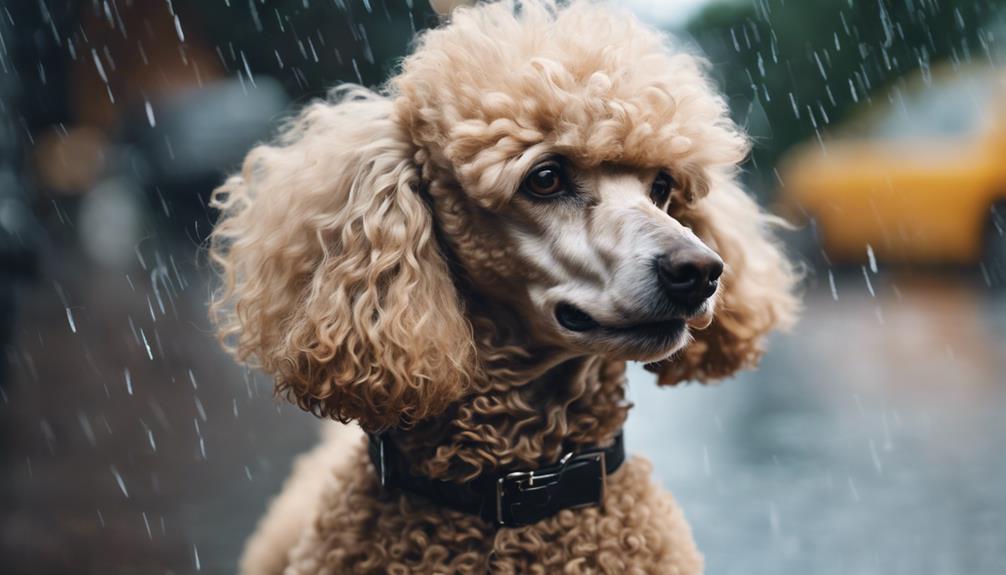
You need to consider how climate influences your Poodle's grooming needs. Weather changes can affect the length and style of your Poodle's haircut to adapt to varying temperatures. Proper grooming habits are crucial in maintaining your Poodle's coat health and comfort in different climates.
Climate and Haircuts
Adjusting poodles' grooming needs according to the prevailing climate is crucial for ensuring their comfort and well-being. Here are four essential points to consider when grooming your poodle based on the climate:
- Hot Climates: Opt for shorter haircuts to prevent heat retention and promote better airflow, keeping your poodle cooler.
- Warm Weather: Shorter haircuts are ideal for maintaining comfort by allowing efficient air circulation.
- Cold Climates: Longer haircuts provide insulation and warmth, protecting your poodle from the chilly weather.
- Changing Conditions: Regular grooming is key to helping your poodle adapt to varying environmental factors and stay healthy year-round. Remember, grooming plays a vital role in your poodle's overall well-being.
Weather and Coat Maintenance
In response to changing climates, maintaining proper coat grooming for poodles is essential to safeguard their health and comfort. Weather variations can significantly affect the condition of a Poodle's coat, necessitating adjustments in grooming routines to address issues like dryness or excess moisture. Adequate coat maintenance in response to weather changes plays a crucial role in protecting Poodles from skin irritations, infections, and discomfort. Grooming needs may vary depending on whether the Poodle is in a cold or hot climate, considering shedding, coat thickness, and temperature regulation. Monitoring the coat's condition and adapting grooming practices based on weather patterns can enhance the overall health and comfort of Poodles.
| Coat Maintenance | Weather Variations | Grooming Practices |
|---|---|---|
| Regular grooming | Dry or moist conditions | Brushing, trimming, and bathing |
| Checking for mats | Cold or hot temperatures | Moisturizing or cooling treatments |
| Adjusting grooming | Changes in humidity levels | Monitoring coat health regularly |
Mental Stimulation Indoors Vs. Outdoors

Indoor mental stimulation for Poodles during inclement weather is crucial for maintaining their cognitive health and preventing boredom. While outdoor exploration is fantastic for their sensory enrichment, here are some reasons why indoor activities are just as beneficial:
- Engage Their Minds: Indoor activities like puzzle toys and training sessions challenge your Poodle's intellect, keeping them mentally sharp and preventing cognitive decline.
- Physical Limitations: When outdoor play is limited due to weather conditions, indoor mental stimulation ensures that your Poodle still gets the exercise they need to stay healthy.
- Bonding Opportunities: Indoor activities provide a chance for you to bond with your Poodle through interactive play and training sessions, strengthening your relationship.
- Weather Flexibility: By incorporating a mix of indoor and outdoor mental stimulation, you ensure that your Poodle remains active and engaged, regardless of the weather outside.
Balancing indoor and outdoor mental stimulation is key to keeping your Poodle happy, healthy, and mentally stimulated year-round.
Seasonal Nutrition Adjustments

When adjusting your poodle's nutrition for the winter, consider increasing their calorie intake to help them stay warm. Including foods rich in omega-3 fatty acids in their diet can promote a healthy coat during the colder months. To keep your poodle cozy, incorporate warming foods such as broths or stews into their meals.
Dietary Needs in Winter
During the winter months, adjusting your Poodle's diet to include warming foods like lean proteins and root vegetables can help them maintain body heat and energy levels. To ensure your Poodle's winter dietary needs are met, consider the following:
- Increase calorie intake to support energy and warmth.
- Incorporate lean proteins and root vegetables for added warmth.
- Supplement with Omega-3 fatty acids for coat health and skin hydration.
- Provide ample hydration through water intake and moist foods to prevent dehydration.
Summer Hydration Tips
For poodles, ensuring adequate hydration in the summer months is vital to prevent heat-related complications and maintain their overall well-being. In hot weather, poodles need increased water intake to stay hydrated. Providing access to cool, fresh water is crucial as dehydration can lead to serious health issues during summer. To help boost hydration levels, consider adding wet food or ice cubes to their diet. Monitoring poodles for signs of dehydration, like dry gums or excessive panting, is essential for their well-being in the heat. By taking these summer hydration tips into account, you can help your poodle stay healthy and happy during the warmer months.
Fall Ingredient Variations
Fall's transition brings an array of seasonal ingredients that can enhance your poodle's nutrition and well-being. Adjusting your furry friend's diet during this season can have a positive impact on their overall health. Here are some fall ingredient variations to consider for your poodle:
- Antioxidant-rich Fruits and Vegetables: Incorporate seasonal produce like apples and squash to provide essential vitamins and antioxidants.
- Immune Support: Ingredients such as pumpkin, sweet potatoes, and cranberries can help boost your poodle's immune system.
- Coat and Skin Health: Utilize fall ingredients to ensure your poodle's coat and skin receive the necessary nutrients for optimal health.
- Fiber and Moisture: Adding ingredients like sweet potatoes and apples can enhance fiber intake and provide additional moisture to support your poodle's well-being.
Paw Care in Varying Conditions
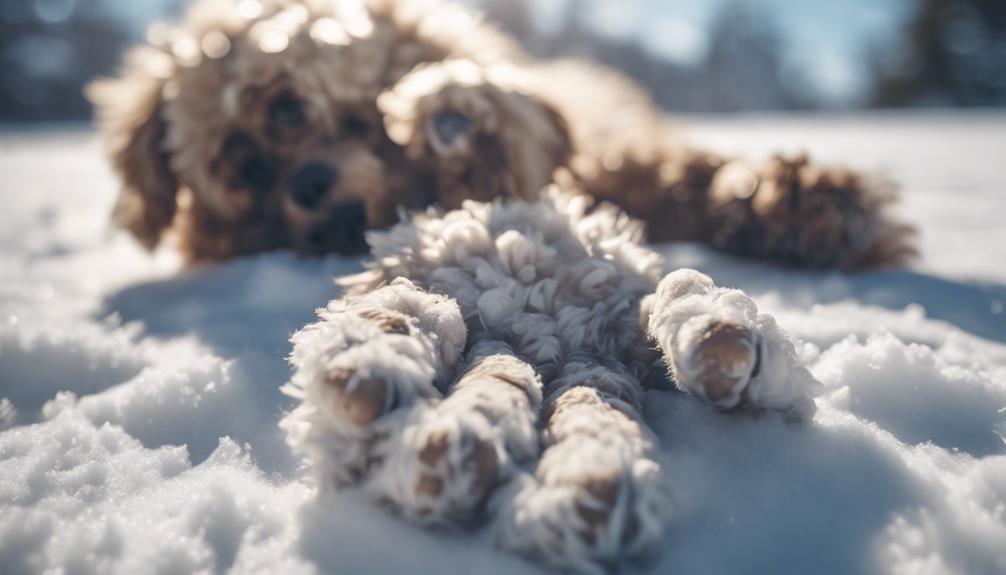
How can you effectively protect your poodle's paw health in varying weather conditions? When it comes to ensuring your poodle's paws are well taken care of in different weather conditions, there are several key strategies to consider. One important aspect is the use of protective measures like dog booties or paw wax to shield their sensitive paw pads from extreme temperatures. Additionally, regular maintenance such as trimming the fur around the paw pads and applying moisturizing paw balms can help prevent issues like dryness and cracking, especially in cold weather. It's also crucial to check for ice and snow buildup between the paw pads to avoid discomfort and injuries. Below is a table summarizing essential paw care practices for poodles in varying conditions:
| Paw Care Tips | Description |
|---|---|
| Use dog booties | Provide insulation and protection from hot pavement or icy surfaces. |
| Apply paw balms | Moisturize and protect poodle's paws from dryness and cracking in cold weather. |
| Trim paw pad fur | Prevent ice balls from forming during winter walks. |
| Check for ice buildup | Regularly inspect between paw pads to avoid discomfort and injuries. |
Behavioral Changes and Weather
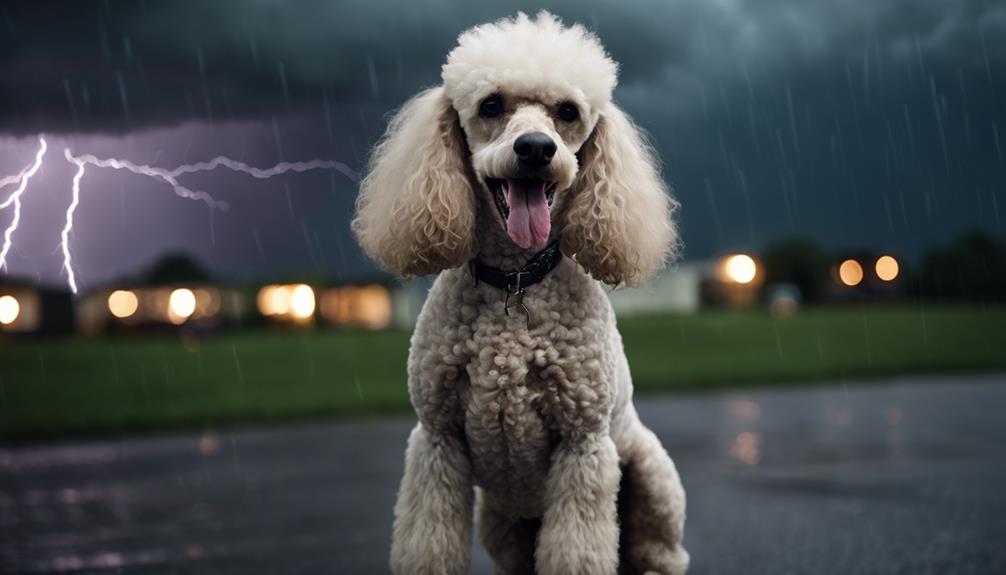
Changes in weather can significantly influence a Poodle's behavior, impacting their activity levels and mood. When it comes to cold weather, Poodles might display specific behavioral changes that signal their discomfort:
- Reluctance to Go Outside: Poodles may show hesitation or refusal to go outside in extreme cold, preferring to stay indoors where it's warm.
- Seeking Warmth: They might seek out warm spots in the house, like near heaters or under blankets, to combat the cold temperatures.
- Shivering: Poodles may shiver or tremble when exposed to chilly weather, indicating that they are feeling the cold acutely.
- Change in Energy Levels: Cold weather can also lead to a decrease in their energy levels, making them less active than usual.
Understanding these behavioral changes in response to cold weather is crucial for adjusting their care and ensuring their well-being. By recognizing these signs of discomfort, you can take steps to make your Poodle more comfortable and help them cope better with the changing weather conditions.
Ensuring Poodle Comfort in All Seasons

In ensuring your Poodle's comfort in all seasons, it is vital to consider their unique coat and susceptibility to temperature changes. Poodles, with their dense, curly coat, are naturally more resilient to lower temperatures, but precautions are still necessary, especially in cold weather. During colder seasons, maintaining a warm indoor environment for your Poodle is crucial. Providing them with warm coats when heading outdoors can help protect them from the cold and prevent issues like hypothermia and frostbite. Regular grooming is essential to prevent skin irritation and maintain the health of their coat during winter.
When taking your Poodle outdoors in cold weather, be mindful of the time spent and keep activities brief to prevent discomfort. Adjusting exercise routines to include more indoor play or mental stimulation activities can help keep your Poodle active and engaged regardless of the weather. By being attentive to your Poodle's needs and making adjustments accordingly, you can ensure their comfort and well-being in all seasons.
Frequently Asked Questions
Can Weather Affect Dogs Health?
Weather can indeed affect a dog's health. It can exacerbate seasonal allergies and impact coat maintenance. Understanding how weather impacts your furry friend is key to their well-being. Stay informed and adjust care accordingly.
Are Poodles Good in Hot Climates?
Are poodles good in hot climates? Poodles, with their thick, insulating coat, struggle to regulate body temperature in high heat. Summer grooming and providing shade, water, and cooling options are crucial for their comfort and health.
Can Poodles Withstand Cold Weather?
In cold weather, your Poodle's thick coat offers insulation, but they can still feel uncomfortable below 40°F and distressed under 32°F. Ensure warm coats, shelter, and indoor warmth for their well-being during winter exercise.
Can Dogs Get Sick From Bad Weather?
You can protect your furry friend from getting sick in bad weather by avoiding exposure to extreme conditions and ensuring they have proper shelter. Keep an eye out for signs of discomfort and seek veterinary care promptly.
Conclusion
You've learned about the impact of weather on Poodle health, especially during winter. Just like a delicate flower needing protection from the cold winds, Poodles require special care to thrive in chilly conditions. By providing them with warmth, shelter, and attentive care, you can ensure your furry companion stays safe and healthy throughout the changing seasons. Remember, a well-cared-for Poodle is like a blossoming flower in a nurturing garden – vibrant, happy, and full of life.
